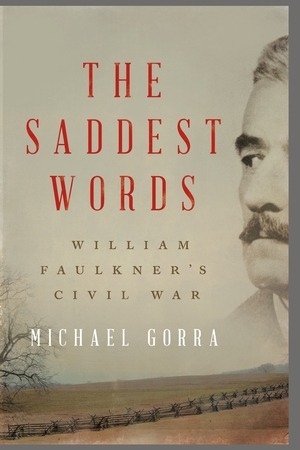Book World: William Faulkner couldn't overcome racism, but he never ignored it

The Saddest Words: William Faulkner's Civil War
By Michael Gorra
Liveright. 433 pp. $29.95
- - -
In one characteristically lyrical passage of "The Saddest Words: William Faulkner's Civil War," Michael Gorra describes a scene from Faulkner's novel "The Unvanquished," in which "time hangs suspended, and yet so does a sense of enduring crisis," followed by "ever-faster change, faster fall." When I first opened the book, we were all in quarantine, and nothing seemed to change except the rising covid-19 death toll. By Chapter 2, we had hurtled into protests, tear gas and statue removals, with the looming prospect of a tumultuous election hanging over everything. Gorra could not have foreseen our current moment when he began this work of biography, history and literary criticism. Yet his extended meditation on whether and why we should continue to read the work of a privileged White novelist from Jim Crow Mississippi often seems to describe exactly where we are.
The saddest words - "was" and "again" - come from Faulkner's novel "The Sound and the Fury" (1929). Jason Compson, a lawyer corroded by drink and disappointment, tells his son, Quentin, that "was is the saddest word of all" because something that "was is fixed and unchangeable, forever in the past, an event - a mistake - that can be neither altered nor redressed." Quentin later decides "that again is even sadder than was, saddest of all. For the term suggests that what was has simply gone on happening, a cycle of repetition that replays itself, forever."
Repeated mistakes and cruelties trapping families over centuries in one Mississippi county make up Faulkner's Yoknapatawpha fiction, which loops forward and backward in time, through prequels and sequels published over 30 years, to tell the story of this imagined county modeled on Faulkner's Mississippi home. All of it wrestles with the legacy of the Civil War, "the central quarrel of our nation's history," caused by the problems of slavery and violent structural racism. The war resolved the first problem but not the second. Faulkner knew that truth, and though he could not meet its demands in his life, his fiction could not look away from it, which is why, according to Gorra, it remains necessary.
Gorra builds his case through three sections. The first is chiefly biographical, unspooling Faulkner's own story from his birth in 1897 backward through prior generations and forward through a career that took him from Mississippi to Paris, to Hollywood, to Stockholm, and back to Mississippi. The section culminates by narrating Yoknapatawpha's story in more straightforward chronological order than the novelist himself ever did. The second section recounts the Civil War and emancipation in Mississippi, noting where historical events appear in particular novels. The third section sifts and excavates Faulknerian passages for revelations about race.
Faulkner often falls short. His fiction developed Black characters less fully than Whites, sometimes portrayed enslaver families as the patrician paternalists they pretended to be, and never depicted the beatings or sales of enslaved people that made enslavers' worlds possible. In his life, he represented Whites' violent overthrow of Reconstruction as a noble crusade, "used racial epithets almost every day" and claimed that "Southern Negroes would be better off under the conditions of slavery." Gorra does not shy away from these failings, but he does try to soften them with regretful sighs about how such views were typical of most Mississippians in Faulkner's day. We say that sort of thing a lot, but we are wrong, because the majority of Mississippians - 57.6 percent when Faulkner was born, according to the census, and 56.2 percent when he began to write - were Black. We excuse the racism by refusing to see Black Mississippians, which is something Faulkner did not do.
The argument, then, for why we should still read Faulkner is not a "man of his time" apologia. Rather, the argument grows from Faulkner's insistence that the only thing worth writing about was "the human heart in conflict with itself." His fiction grapples with the conflict over race that roiled his own heart and that sent the heart of the nation to war with itself. That conflict entangles Yoknapatawpha families - the Sartorises, Sutpens, Compsons, McCaslins, Beauchamps, Bundrens - with one another and turns them against themselves. Faulkner's refusal to look away explains why the novels return to the same places and characters. His fiction provides a landscape in which his failings - which were also his region's and his nation's - can be faced more squarely.
One example of the heightened clarity enabled by Faulkner's famously opaque fiction comes in the character of Ike McCaslin in "Go Down, Moses" (1942). McCaslin first appears as a 16-year-old who walks away from his inheritance upon discovering that his family's fortune grew from exploiting land and turning people into cash. Reappearing later as a childless old man, he meets a mixed-race woman and her baby, his relations, who could be his link to the future, but the embittered McCaslin banishes them. Turning away from a history of racist violence is one thing, remedying its consequences quite another. McCaslin could not do it. Neither could Faulkner, but he could craft scenes in which readers feel disappointment and loss about that failure.
By creating characters like McCaslin, Gorra demonstrates, Faulkner "became better than he was" and spoke in a voice we still need to hear. That voice tells us that slavery was. The Civil War was. Violent racist oppression was. And here we are again.
- - -
Manning is a professor of history at Georgetown University and the author of "Troubled Refuge: Struggling for Freedom in the Civil War."





